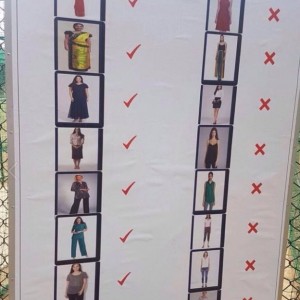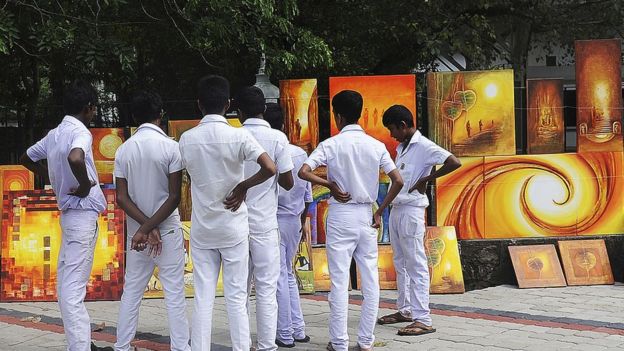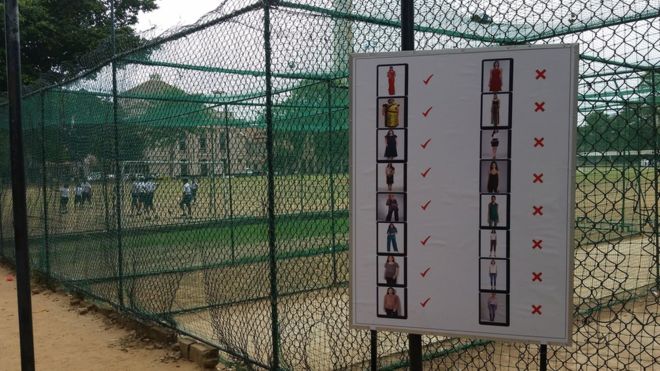A poster outside a Sri Lankan boys’ school telling women what to wear is generating heated debate on social media. The BBC’s Ayeshea Perera explains why people in the capital Colombo are so outraged.
At first glance, you would be forgiven for thinking it was a page from a cheap fashion magazine.
The poster on display outside St Joseph’s College – one of Colombo’s elite private schools – has no text of any sort.
Instead it shows 16 pictures of women in a variety of outfits, with tick marks against half and crosses against the rest.
No, it’s not a crash course in what is and is not fashionable in Colombo right now.
Instead, it’s a notice to women about what they can and cannot wear when they enter school premises to meet teachers, or pick their children up from inside the school.
Traditional saris are allowed, as are apparently baggy shapeless dresses and what look suspiciously like hospital scrubs. On the “not allowed” list are strappy tops, mini skirts and anything without sleeves.

The furore began after a former St Joseph’s student put a picture of the poster on Facebook.
A member of the administrative staff at St Joseph’s confirmed the strict dress code for women entering the school premises. “If they want to come into the school they have to be dressed appropriately,” the staff member told the BBC.
And it’s not just St Joseph’s.
Another leading private school in Colombo, St Peter’s College, confirmed it has a similar notice outside its gates. “This is a boy’s school after all and we have a notice so that women know what they should and should not be wearing,” an office member said, adding that women who did not adhere to the dress code were turned away.
What about midriffs?
Many of the responses to the poster were of outrage. “Well done…We are now properly regressing,” read one comment, while someone else suggested that all the female staff and mothers of students turn up in “male national sarong dress or swimwear” in protest.
Some parents noted that many other schools, including “international schools”, were also in the habit of turning away women in sleeveless clothes despite not having put up posters about it.

Others commented on the irony of forbidding strappy tops and sleeveless clothing when the sari – right on top of the “approved” set of clothing – traditionally showed off a woman’s midriff.
“So no jeans? No tights? No sleeveless? But midriff bearing saree is okay. Not that it matters that it’s midriff bearing. But who gets to decide that arms are more offensive? Or that pants are better than jeans? Also, do they realize we live in a tropical country? Moreover, where is the board for dads?” wrote Vraie Cally in a Facebook post.
Young mothers and ‘inappropriate clothing’
While dress codes for women entering boy’s schools is common in government-run schools – they can wear only saris – the imposition of one in private schools like St Peter’s and St Joseph’s is a recent phenomenon.
There were certainly no such posters at these schools when I was a student in Sri Lanka 16 years ago. When my mother would visit she would wear formal Western clothing, including skirts that were either knee length or a little shorter – outfits that are likely to be on the wrong side of this new dress code.
It’s difficult to say why the school authorities have suddenly seen a need to tell women visiting their schools what they should and should not be wearing.
One reason could be a rise of conservative values in Colombo due to the expansion of the middle class in the city, which means that these private schools are now open to people of more traditional backgrounds.

The Sri Lankan president is among those who have expressed dismay at the behaviour of the modern Colombo woman
There is also definitely a sense that there has been an upsurge of conservative values in Sri Lanka, particularly since the end of the civil war in 2009. Apart from the rise of more nationalistic politicians and parties, there has also been some “dismay” at the behaviour of modern women in Colombo.
Most memorably, this was demonstrated by Sri Lanka’s President Maithripala Sirisena who said that the organisers of an Enrique Iglesias concert should be “whipped” over the behaviour of some female fans.
A teacher at a girl’s school in Colombo who declined to be named told the BBC that she felt the dress code was needed because “a lot of parents, particularly young mothers today wear inappropriate clothing to boy’s schools”.
While she thought the method of telling parents what to wear and not wear was objectionable, she said she understood the rationale behind the poster.
… and boys and their hormones

“These are boys who are segregated after all and there have been behavioural problems especially among older students towards and with young parents,” she said.
There were a number of others who also defended the motive behind the notice.
“While I’m not an expert to provide a psychoanalytical viewpoint on this, my own personal experience comes from being in a boys-only school with 6,000 other boys,” said Fawaz Mulafer. “All I can say is that you shouldn’t underestimate the power of repressed, raging hormones.”
But many more said that this was hardly the way to counter already regressive attitudes towards women, and the problem is certainly not with how women dress but how men behave.
Thushanti Ponweera, a young mother, said she found the notice “depressing”.
“Unless we, as the guardians of the next generation, are changing the way we think, the future seems very bleak. Choosing a school with no such impositions doesn’t mean the impositions won’t continue to exist, and that is the real problem,” she said
